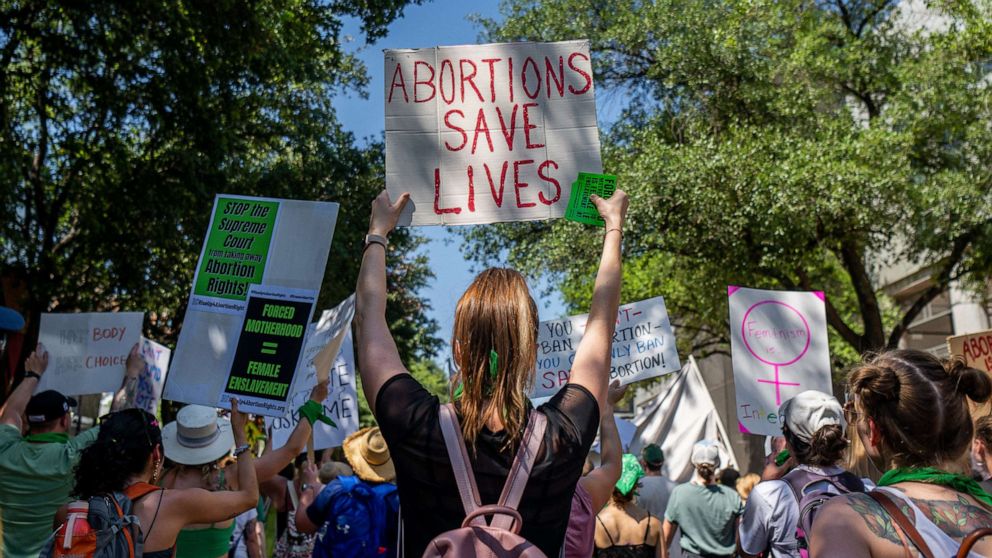


When the Supreme Court overruled Roe v. Wade -- the landmark decision that guaranteed the right to abortion -- it was thought the decision would drive voters to the polls for the midterm election.
Surveys have indicated younger female voters strongly oppose restrictions and care more about abortion rights than any other issue.
Democrats were banking on abortion rights being a key issue going into the midterm elections, but a large percentage of Americans say it is not critical to their vote.
MORE: Young women are angry about abortion rights, but will they tip the midterm elections?According to an ABC News/Washington Post poll released Sept. 25, abortion is not the most top-of-mind issue for most voters, Democrat or Republican.
See PDF for full results, charts and tables.
Among all voters, the economy was the top issue, with 84% saying it was highly important. This was closely followed by education and schools, with 77% calling it highly important; inflation, with 76%; and crime, with 69%.
Abortion came fifth on the list, with 62% referring to the issue as an important one.
"I'm a little skeptical of the recent polling on this. I think we don't know the impact of the abortion issue, because it's not your usual public policy issue," Elaine Kamarck, founding director of the Center for effective Public Management at the Brookings Institute, told ABC News.
Oklahoma State Rep. Jim Olsen, a co-author of one of the state's anti-abortion bills and a Republican, told ABC News his constituents are concerned with what affects them directly.
While an estimated one-in-four women will have an abortion by age 45, according to the Guttmacher Institute, a research group focusing on sexual and reproductive health, Olsen says abortion doesn't concern the majority of the population.
"My wife, my daughters, my mother, my mother-in-law, none of them have ever had an abortion," he said. "It's not an issue that directly touches us because none of them would have made that choice, legal or illegal. But what touches a lot of people is the skyrocketing inflation."
Cathi Herrod, president of the Center for Arizona Policy, a nonprofit organization that has supported abortion-restricting laws in the state, told ABC News she hears state residents more concerned about the economy. A recent Wallethub study found the Phoenix-Mesa-Scottsdale area had seen inflation rise the most of all U.S. cities, with a 13% increase in prices over the last year.
"Arizonans are concerned about the economy," she said. "The Phoenix area has one of the highest rates, if not the highest rate of inflation in the country. ... That's top of the mind for voters."
MORE: What voters in 4 swing states say about inflation, abortion and extremismBut Supermajority, a group focused on mobilizing female voters co-founded by Cecile Richards, a former president of Planned Parenthood, told ABC News even though its polling suggests women are not single-issue voters, the group has seen a surge in volunteer sign-ups and there are indications of an increase in voter registration in some states.
In Michigan, where an abortion question is on the ballot, women are out-registering men by a margin of 8.1% and Democrats are out-registering Republicans by 18%, according to data analysis conducted by TargetSmart.
Amanda Brown Lierman, director of Supermajority, also told ABC News that on the ground, a lot of women were shocked by the court's decision. She said there is "a lot of rage out there" and that abortion has become a highly motivating issue for them.
Although polling indicates abortion is not a top of mind issue, the September ABC News/Washington Post poll found 64% opposed the Supreme Court decision to overturn Roe v. Wade and the public trusts Democrats to handle abortion over Republicans by a wide 20 points.
Researchers told ABC News abortion could be a sleeper issue that may have an impact at the polls.
Kamarck argued it is a clearly delineated issue with Democrats supporting abortion rights and Republicans supporting some sort of abortion ban, which is not the case when it comes to things like inflation. She also said there is an intensity when it comes to how passionate voters are on the issue, regardless of their position, and that this is an issue of intense interest to women, who make up the majority of the electorate.
Unlike other voter demographics, "very small movements among the women's vote turn into very, very big numbers," Kamarck said.
Republicans candidates who were strongly anti-abortion are now "trimming their sails" and retreating from their previous positions to more moderate ones, according to Kamarck.
Republican Minority Leader Sen. Mitch McConnell, who had previously opened the door to a federal ban, stepped away from Sen. Lindsey Graham's proposed 15-week ban in September, saying party members would likely prefer abortion be dealt with at the state level.
Graham including exceptions for rape, incest and to save the life of the mother in the bill is also a step back from his previous harsh stance on abortion, Kamarck said.
MORE: Resounding abortion rights vote in Kansas may reshuffle midterm environmentOklahoma has one of the strictest abortion laws in the nation, with no exceptions for rape or incest, only if the life of the mother is in danger. Rep. Olsen said he's seen a "little bit of a push" towards allowing more exceptions to the law, although it's not something he supports.
Voters in Kansas, a traditionally red state, unexpectedly struck down an anti-abortion measure that would have removed protections for abortion rights from its state constitution earlier this year. The measure was defeated with wide margins – 59% to 41% – in the high-turnout primary, which was the first state-level test of voter movement on abortion since Roe was overturned.
"I think that's a good measure of intensity and how this issue may transcend party identification, because not all Republicans are avidly pro-lifers," Kamarck said.